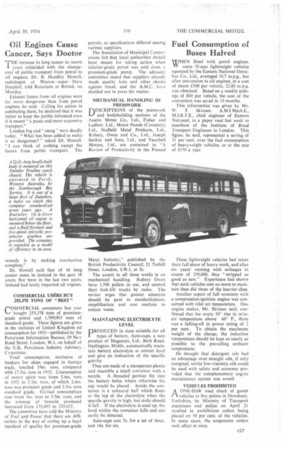Oil Engines Cause Cancer, Says Doctor
Page 77

If you've noticed an error in this article please click here to report it so we can fix it.
THE increase in lung cancer in recent years coincided with the changeover of public transport from petrol to oil engines, Dr. B. Handley Howell, radiologist at Weston super Mare Hospital, told Rotarians at Bristol, on Monday.
Exhaust fumes from oil engines were far more dangerous than from petrol engines, he said. Calling for action in combating them, he declared that it was better to keep the public informed even if it meant "a panic and more expensive transport."
London fog and" smog •' were deadly today. "What has been added to make it so dangerous?" asked Dr. Howell. "I can think of nothing except the fumes from public transport. The remedy is by making combustion complete."
Dr. Howell said that of 16 lung cancer cases in Iceland in the past 18 years, five were in the last two years. Iceland had lately imported oil engines.
COMMERCIAL USARS BUY 255,378 TONS OF " BEST "
COMMERCIAL consumers last year bought 255,378 tons of premiumgrade petrol and 1,709,063 tons of standard grade. These figures are given in the statistics of United Kingdom oil consumption for 1953—published by the Petro!eurn Information Bureau, 29 New Bond Street, London, W.1, on behalf of the U.K. Petroleum Industry Advisory Committee.
Total consumption, exclusive of bunkers for ships engaged in foreign trade, totalled 19m. tons, compared with 17.5m tons in 1952. Consumption of motor spirit rose from 5.4m. tons in 1952 to 5.7m. tons, of which 2.4m. tons was premium grade and 3.3m tons standard grade. Oil-fuel consumption rose from 5m. tons to 5.5m. tons, and the onnage of benzoic produced increased from 175,493 to 233.622.
The committee have told the Ministry of Fuel and Power that there are difti'collies in the way of setting up a legal standard of quality for premium-grade
petrols, as specifications differed among various suppliers.
The Association of Municipal Corporations felt that local authorities should have means for taking action when inferior-grade petrol was sold from a premium-grade pump. The advisory committee stated that suppliers already made quality tests and other checks against fraud, and the A.M.C. have decided not to press the matter.
MECHANICAL HANDLING OF PRESSWORK
DESCRIPTIONS of the presswork and bodybuilding sections of the Austin Motor Co., Ltd., Fisher and Ludlow, Ltd., Motor Panes (Coventry), Ltd., Nuffield Metal Products, Ltd., Rubery, Owen and Co., Ltd., Joseph Sankey and Sons, Ltd., and Vauxhall Motors, Ltd., are contained in "A Review of Productivity in the Pressed
Metal Industry," published by the British Productivity Council, 21 Tothill Street, London, S.W.1, at 2s.
The accent in all these works is on mechanical handling. Rubery Owen have 1,500 pallets in use, and control their fork-lift trucks by radio. The review urges that greater attention should be paid to standardization, simplification and cost analysis to reduce waste.
MAINTAINING ELECTROLYTE LEVEL
PRODUCED in sizes suitable for all types of battery, Auto-caps, a new product of Magnatex, Ltd., Bath Road, Harlington, Middx, automatically maintain battery electrolyte at correct level and give an indication of the specific gravity.
They are made of a transparent plastic and resemble a small container with a nozzle. A threaded portion fits into the battery holes, where otherwise the cap would be placed. Inside the container is a coloured ball which floats at the top of the electrolyte when the specific gravity is high, but sinks should it fall. If the electrolyte is used Up, the level within the container falls and can easily be detected.
Auto-caps cost 7s. for a set of three, and 14s. for six.
Fuel Consumption of Buses Halved
WHEN fitted with petrol engines, some 35-seat lightweight vehicles operated by the Eastern National Omnibus Co., Ltd., averaged 10.7 mpg., but after conversion to oil engines, at a cost of about £500 per vehicle, 22.80 m.p.g. was obtained. Based on a weekly mileage of 800 per vehicle, the cost of the conversion was saved in 19 months.
This information was given by Mr. W. T. Skinner, A.M.I.Mech.E., M.I.R.T.E., chief engineer of Eastern National, in .a paper read last week to members of the Institute of Road Transport Engineers in London. This figure, he said, represented a saving of 31 per cent. over the fuel consumption of heavyweight vehicles, or at the rate of £150 a year.
These lightweight vehicles had taken their full share of heavy work, and after six years' running with mileages in excess of 250,000, they " stripped as good as new." Experience had shown that such vehicles cost no more to maintain than did those of the heavier class.
Another aspect of full minority with a-compression-ignition engine was concerned with inlet air temperature. One engine maker, Mr. Skinner said, confirmed that for every 10° rise in inletair temperature above 60° F., there was a falling-off in power rating of 2 per cent. To obtain the maximum weight of the charge, the induction temperature should be kept as nearly as possible to the prevailing ambient temperature: He thought that detergent oils had an advantage over straight oils, if only marginal, whilst low-viscOsity oils could be used with safety and economy provided that the complementary engine maintenance system was sound.
VEHICLES PROHIBITED A ONE-DAY road check of goods vehicles at five points in Dewsbury, Yorkshire, by Ministry of Transport examiners and police on April 21 resulted in prohibition orders being placed an 50 per cent. of the vehicle& In some cases, the suspension orders took effect at once.




















































































































































































































































